|
Mad Scientists and Monstrous Creations pt.2:
The Continuation of the
Frankenstein Myth in
Modern Science Fiction and Horror Films
of the 21st century
The 6th Day
(USA 2000)
In 2000 Hollywood provided another example of a film featuring a mad
scientist creating new life: In the Arnold Schwarzenegger vehicle The 6th
Day (USA 2000; dir: Roger Spottiswoode) the Austrian muscleman, who
later managed to become the Governor of California, has
to face the bitter truth that he has been cloned.
In the near future cloning
of animals and organs is part of everyday life, whereas cloning of
humans is strictly prohibited. Still,
Michael Drucker, head of multi-billion
dollar corporation Nu Tech, secretly runs a cloning facility where he
reproduces humans. This process includes both the genetic reproduction of a
human being as well as reproducing a persons's whole memory, which is
achieved by reading and
copying the mind via an eye scan, a method called
"syncording". Thanks to this
elaborate cloning process humans are now seemingly immortal since a clone not only has the
original person's physical features but also the
same memories and feelings. However, the real Schwarzenegger character and
his accidental clone team up and in the end evil Drucker, who himself has been cloned
several times (once after he was assassinated by an
anti-cloning
fundamentalist), is
destroyed and not given the chance of a rebirth.
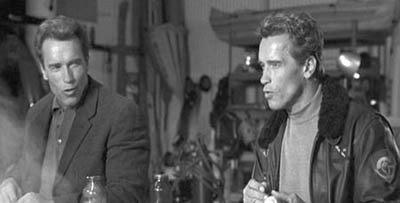
"Who am I if he is me?", is the burning question on Schwarzenegger's mind
Although this film was made strictly
according to the "evil scientists is killed by his own creation"
formula and features the usual bunch of Hollywood clichés (including a
ridiculous happy ending, that does not seem to fit into the overall dark
mood of the film), it is a quite interesting version of the Frankenstein
story, playing like a mix of Blade Runner, The Fugitive
and Schwarzenegger's best movie Total Recall .
At a time when Great Britain discussed the legalisation
of human embryo
cloning for medical purposes,
it tackled one of today's hottest
topics, cloning and genetic engineering.
Additionally, the film also presents some
interesting variations on the doppelganger motif and on the Frankenstein
story. Dr. Weir, the inventor of the cloning process, is the film's real
Frankenstein figure. A man of good intentions, his driving force is
to help people conquer terminal diseases.
Drucker, on the other hand, is a true villain, complete with standard
Hollywood story telling clichés. He uses Weir only for his own selfish purposes. Although he is
"finally able to conquer death" he uses this ability only to
expand his own power, when he implants a 5-year life span (similar to Blade
Runner's replicants) into his clones to keep control over them and to make sure they won't "leave the
team".
Unfortunately
The 6th
Day avoids any serious discussion of the cloning
topic
and
ends up as being nothing more than another Arnie action
vehicle with a
sometimes rather unimaginative
script by Cormac and Marianne Wibberley.
The Hulk (2003)
Hulk (USA 2003; dir: Ang Lee), based on a Marvel comic book series created by Stan Lee and Jack Kirby, plays like a mixture of
Frankenstein, Jekyll & Hyde, King Kong and Japanese Manga Comics. It is the story of scientist Bruce Banner, who turns into an indestructible, rampaging, 5m high, green giant whenever someone or something makes him angry. This transformation is caused by a genetic mutation, which itself is the result of experiments that Bruce's father did on himself and his son. Praised by many critics as the arthouse version of comic book movies,
Hulk is undoubtedly one of the best and most intelligent films based on a comic book. Taking its subject matter very seriously, director Ang Lee is probably the first film maker to successfully transform the medium of comic books to the big screen, using elaborate split screen (reminiscent of the panels of comic books) and multiple angles techniques, mixing it with breathtaking visuals and an atmospheric soundtrack that is often reminiscent of his highly successful martial arts drama
Crouching Tiger Hidden Dragon. Despite its intention as a Hollywood blockbuster action movie, Ang Lee, whose prior credits include arthouse drama such as The Ice Storm, and screenwriter James Schamus have turned
Hulk into a mixture of comic book and psychological drama. In particular the (admittedly) somewhat slow-going first half concentrates on Bruce Banner/The Hulk's origin, his inner conflicts, failed father-son/daughter relations, family ties and an unsuccessful love relationship between Banner and fellow scientist Betty Ross. The second-half then explodes onto the screen with never-before-seen action set pieces, where a stunning CGI-animated Hulk battles the US army - and is finally conquered by love. The fact that the berserking Hulk looks somewhat artificial, which the film was often criticized for, actually does not does not do it any harm. In fact it adds to the visual style of the movie, which itself is highly artificial in its editing efforts to imitate and transform comic book techniques and style..
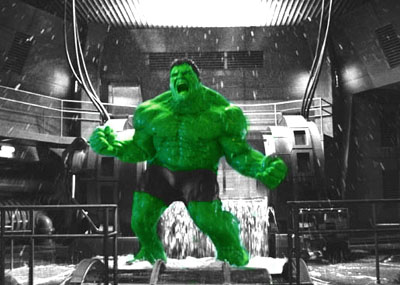
Freud for beginners: Id triumphs over Ego
and Superego
While Hulk is a great achievement as a comic book film - although one that surely will not appeal to the average blockbuster audience - Ang Lee's masterpiece is also a very interesting Frankenstein-themed movie containing several references to Shelley's story, although often hidden and mixed with elements from other literary classics. Still it is overly justified to include
Hulk here, since it contains many things one would expect from a good Frankenstein-inspired story:
Firstly, there is the mad scientist - Bruce's father - who tampers with God's creation and whose experiments go awfully awry. He ruins his own life, he destroys his family and - most importantly - creates something he did not want to create and therefore finally summons his own demise.
| The character of the Hulk itself is also a nice variation on the Frankenstein topic. Like the monster in Shelley's novel, the Hulk is endowed with supernatural strength, but these powers (and his hideous appearance) are more a curse to him than a blessing. Society (represented by the army) considers the Hulk a threat and therefore has only one solution in store: the complete annihilation of the monster - of course only after unsuccessfully trying to "domesticate" the Hulk and - as is always the case when the army is involved - exploiting his unique genetic features in order to create an invincible super soldier. |
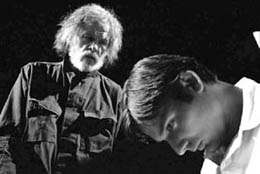
Creator and Creation: Nick Nolte and Eric Bana |
Bruce
Banner/Hulk is also completely left alone to deal with his curse, abandoned by his creator, feared by society. His father deserted him and had to give him to foster parents when his experiments
got completely out of hand and he was consequently imprisoned for many years. Only years later Bruce Banner learns about his origin, when his father returns and seeks him out to continue his experiments. In an epic final battle the Hulk destroys his father, who through genetic mutation himself has become a superhuman monster - the typical "creation kills creator" ending of most monster-cum-mad-scientist movies.
Obviously,
Hulk is also a variation of Robert L. Stevenson's Dr Jekyll and Mr
Hyde, the classic story of the respectable scientist who by means of a chemical substance turns into the utterly evil Mr Hyde. But instead of being the personification of Banner's evil side, the Hulk is more like a reduced, brute form of the human being. When Banner turns into the Hulk, this can be seen as a metaphor for the Freudian "Id" set free to dominate him completely. All he can do is to follow his primitive animal instincts and to satisfy his rage and anger, regardless of any limits of human society and Banner's normal, quiet and peaceful personality.

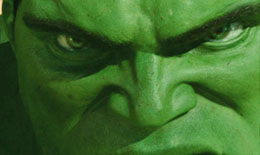
Beauty and the Beast: Jennifer Connelly as Betty Ross and lots of pixels as
Hulk
Another
literary motif in Hulk is that of the beauty and the beast. When Banner
becomes the unstoppable Hulk there is only one person that has any power
over him: fellow scientist Betty Ross, the one person that truly loves nerdy
Bruce Banner. She manages to soothe the Hulk and turn him back into Bruce,
but unwillingly becomes the tool of military schemes and turns Banner in to
the army.
So there is only one mystery left: why does Bruce Banner rip apart his clothes when he transforms into the Hulk, but his pants seem to have the ability of stretching and growing to
three times their original size? Is this an ironic nod by Ang Lee who wants to tell us after all that we should not take the film too seriously? Or were the producers simply too afraid to show us the Hulk's gigantic genitalia?
Godsend (2004)
When Paul and Jessie Duncan's eight-year old son Adam is killed in a tragic traffic
accident, they are approached by Professor Richard Wells, a brilliant
scientist, who claims he could bring Adam back by cloning him. First they
are reluctant, but then Paul and Jessie decide to accept the offer.
Nine months later their new son Adam is born and develops exactly like the
first Adam. But soon after his eighth birthday he begins to act
strangely, he is plagued by nightmares and horrible visions of murder and
bloodshed. Adam
alienates the other kids at school and keeps talking about someone named Zachary Clark and a place called St. Pius.
One day
one of the kids is found dead in a river and Paul starts to investigate who
this Zachary Clark might be. He finds out that Zachary was actually Dr. Wells'
son, who killed his mother and died in fire when he was just a little boy.
It turns out that Wells used Zach's genes when he cloned Adam, who now has
two split
personalities: the good Adam and evil Zach.
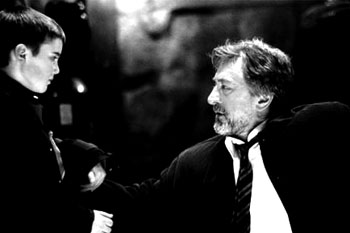
Monster and creator: Adam (Cameron Bright) and Dr. Wells (Robert De Niro)
In Godsend (USA 2004; dir: Nick Hamm) Robert de Niro's Dr. Wells is the mad scientist / Frankenstein figure,
who plays God by creating life. Unlike Shelley's Victor Frankenstein, Dr.
Wells does not use dead body parts, but utilizes genetics and clones a new
boy from the genes of his own son. Like in most films of the genre, the
creation becomes a monster: here innocent Adam repeats the crimes committed
by Zachary, whose genes he carries.
Godsend is a
cautionary tale, that once again warns us of the consequences of playing God
and what happens if scientific discoveries fall into the wrong hands.
Confronted by Paul Duncan with the terrible consequences of his experiment, Dr. Wells asks,
"If I’m not supposed to do this, then why is it that I can?" Completely
absorbed by his work, Wells has lost any sense for ethics and morale,
focused primarily on his goal to defy death and nature. Normally movie
conventions would ask for him to be punished accordingly. However, Mark
Bomback, writer of Godsend has chosen a different path
and in the end
delivers a wholly unsatisfying resolution: Dr. Wells moves to another town
to continue his illegal experiments and it remains uncertain if Adam will
ever get rid of his evil side.
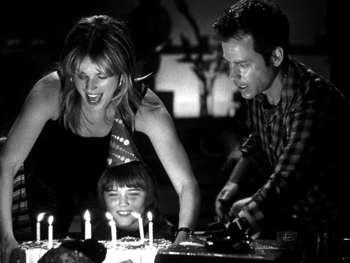
Proud parents: Jessie (Rebecca Romijn-Stamos) and Paul (Greg Kinnear)
What
could have become an exciting modern take on the Frankenstein story ends up
being a dull, slow-moving horror film that focuses on cheap thrills and the
scares generated by the "creepy kid" cliché, so masterly used in Richard Donner's
The Omen more than 30 years earlier.
The release of Godsend was accompanied by an extensive internet publicity
campaign, including a fake website for Dr. Well's Godsend Institute. PR also
focused on the participation of Robert de Niro, whose screen time is
actually very small and whose scenes were filmed in four days – he later
stated that he
regretted his appearance in the movie. Further evidence for the somewhat
messy production history can be found o the movie's DVD: four additional
alternate endings are included, none of which provide the satisfying
conclusion the official ending so painfully lacks.
The Island
(2005)
The Island (USA 2005; dir: Michael Bay) is the perfect 21st
century update to Shelley's Frankenstein. In the near future clones
of humans are bred in order to be harvested for organ transplants. The clones are manufactured secretly by a high tech firm and
brought up in the illusion that they are the sole survivors of a devastating
plague. They live in a sterile environment, wear white clothes, are kept on
a healthy diet and are constantly monitored and supervised by the company.
Every day one clone is selected to go to "the island", a secluded place where
they are supposed to repopulate the planet once again. But in reality going to
the island means that the clone is killed and the organs are used by their
"original" for transplantation. One day one of the clones, Lincoln Six Echo (Ewan McGregor)
finds out the truth and escapes from the facility together with a female
clone (Scarlett Johannson). They are then chased by henchmen of their
manufacturers but manage to escape and eventually free all the other clones
and destroy the cloning facility.
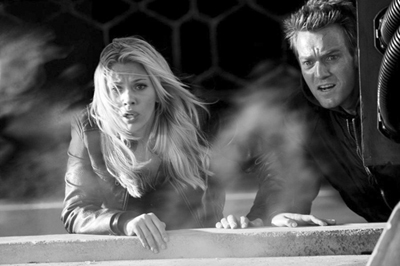
Two pretty monsters (Scarlett Johansson and Ewan McGregor)
In the Frankenstein context, The Island bears several parallels to
Shelley's novel. Its central hero, the clone Lincoln Six Echo, is born with
the mind of a 15-year old, although he looks like an adult. He
gradually learns about the world outside and, like his predecessor in
Shelley's novel, embarks on a quest to find the truth about his existence
and his purpose in life. Originally created for the benefit of mankind, or
in his case much rather that of his "sponsor" - the man who paid $ 5m for a
living organ donor - Lincoln Six Echo becomes a menace to his creators and
therefore has to be hunted down and eliminated. Ultimately Lincoln initiates
the downfall of both his fathers, the scientist Merrick and his sponsor.
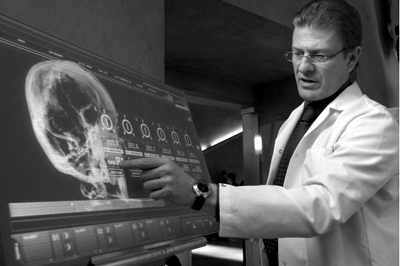
Scientist Merrick (Sean Bean) finds out why his children begin to question
his ways
His creator Merrick (Sean Bean), is a kind of corrupted Victor
Frankenstein. He is convinced that his creations exist solely for the benefit
of mankind. But unlike Victor Frankenstein, Merrick's motives are not
entirely selfless, when he demands monetary compensation for his services.
Of course he has not only transgressed the borders of nature and creation,
but he has also stepped over the line of madness. Believing himself in a
position similar to God's, he alone knows the secrets of life and he alone
decides about life and death of his "children", whom he keeps in a sealed
environment where every little detail from the color of clothes to the daily
diet is determined by Merrick's company. His final destruction is brought
upon him by his creations Lincoln and Jordan. But unlike Frankenstein,
Merrick does not die in regret of his horrible crime against nature. His mission to
eliminate his creations is purely driven by the wish to wipe out a faulty "product" and to replace it with a better version
later. Victor Frankenstein, on the
other hand, wanted to give up his work completely.
Michael Bay's The Island picks up several clever ideas and works
perfectly in its first half, an eerie science fiction parable. The second
half, however, is mainly made up of spectacular action sequences, and many
questions raised in the first half are left unanswered. With a different director the film could have
worked on a more philosophical level or at least have incorporated a good
deal of social criticism. Unfortunately Bay decided to turn it into an
admittedly quite well-executed action extravaganza, which draws its
inspirations from Ridley Scott's Blade Runner, George Lucas'
THX1138 and Steven Spielberg's Minority Report.
© 2003-2008
Andreas Rohrmoser

|


